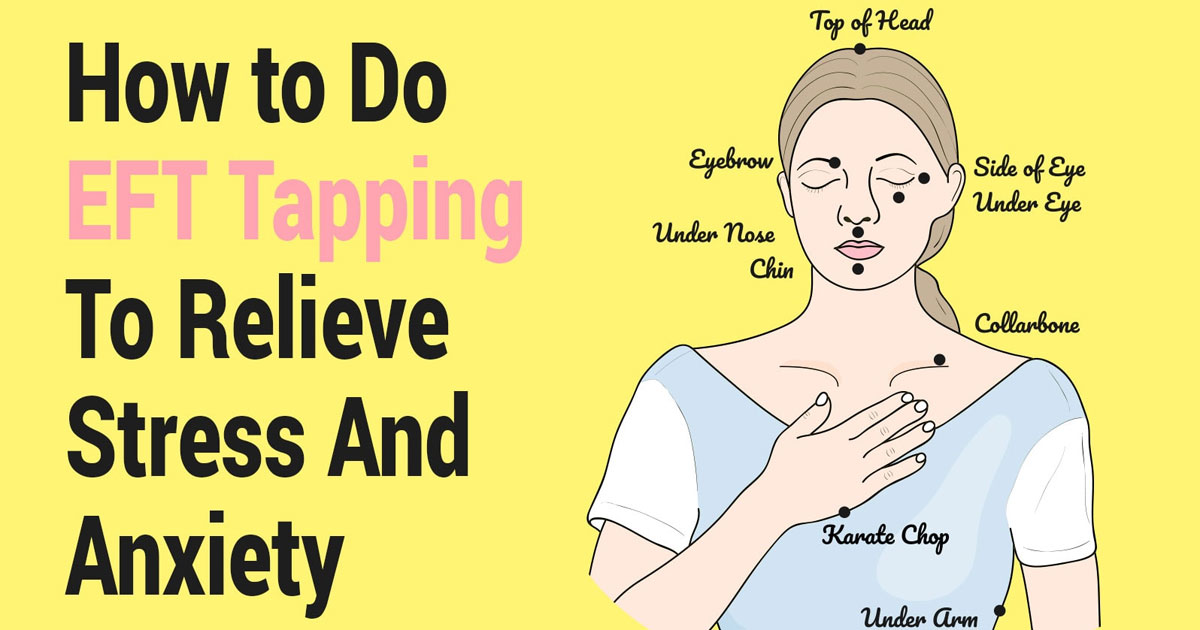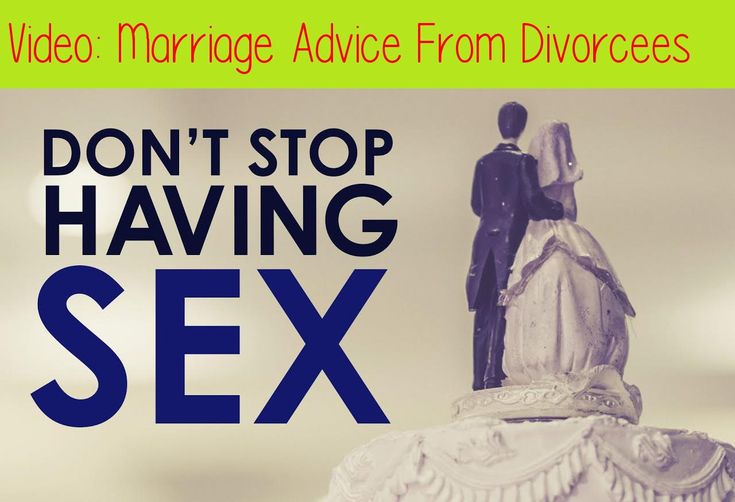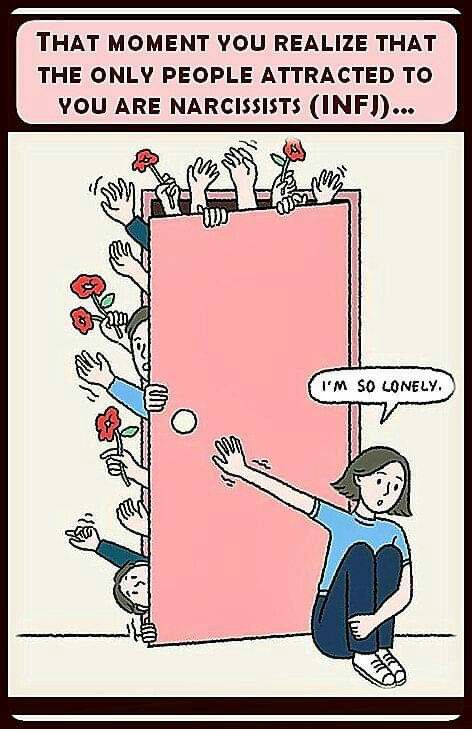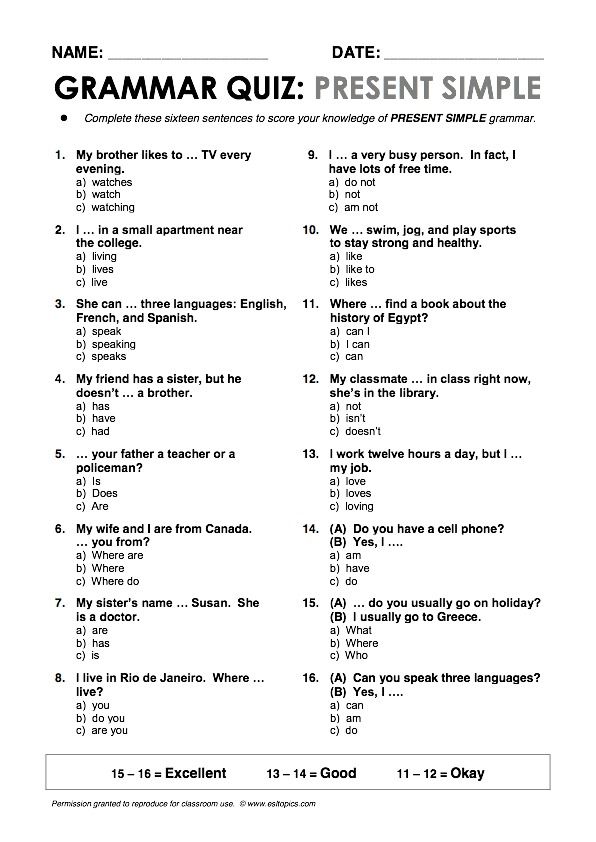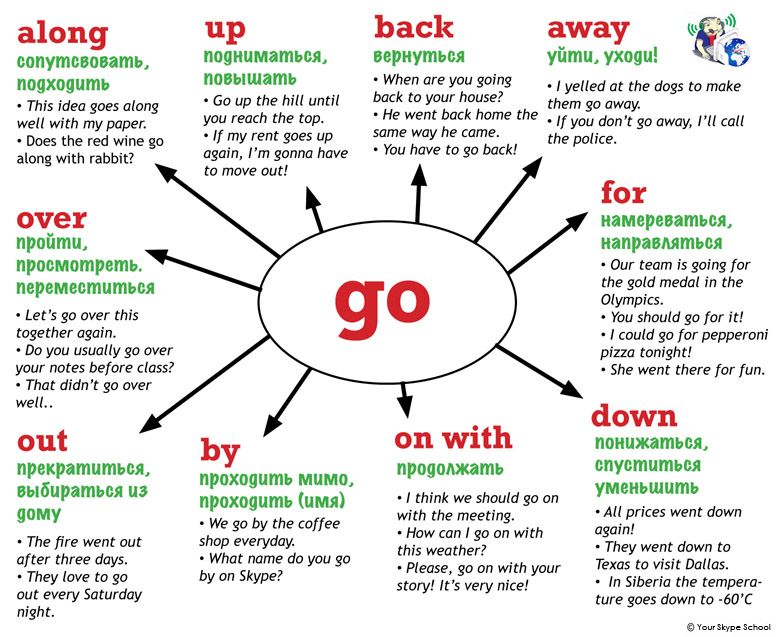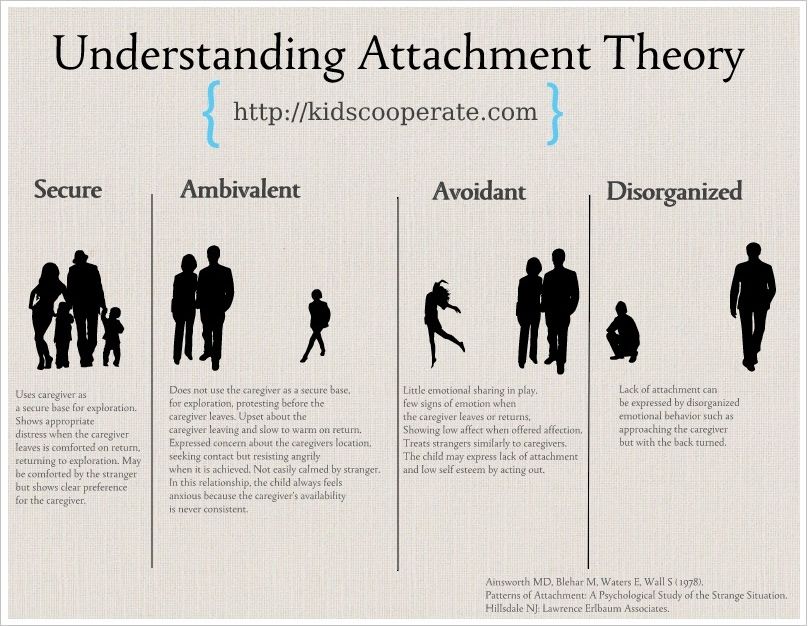Distractions for anxiety
19 Strategies That Can Help Distract From Anxiety
Content
- Overview
- What is a distraction strategy?
- Signs and symptoms of anxiety
- The lowdown
Almost everyone feels anxious at some point in their lives. For some people, anxiety occurs regularly, even daily. Anxiety disorders are common as over 40 million¹ adults in the US suffer from some type of anxiety disorder.
Research has shown that distracting yourself² from feelings of anxiety can help to curb them. Actively distracting yourself takes your mind off of the anxiety you are experiencing. For this technique to be most effective, you need to choose to distract yourself, rather than someone else distracting you.
It can be difficult to think of things to do as a distraction when you are already feeling anxious. Below is a list of distraction strategies you can implement that have been shown to reduce anxiety.
You can do many of these strategies anywhere and anytime you start to feel anxious. It may be a good idea to note down the strategies you find particularly helpful so you can remember to use them if you are out and about.
A distraction strategy is simply an activity that takes your mind off your current emotions. Instead of putting your energy into your worries and increasing your anxiety, you can focus on other things instead to give your mind and body time to calm down.
Distraction strategies help lessen anxiety when it is bad, but they are best when used alongside other treatments. If you experience anxiety regularly, you should talk to your doctor about treatment options to best manage your anxiety in the future.
Below are some common symptoms of anxiety, but know that anxiety looks different for everyone. Some people may experience more, or more severe, symptoms than others. It is important to know the early signs of anxiety so you can take action to distract yourself before it worsens and feels unmanageable.
Common symptoms include:
Hyperventilation (rapid, shallow breathing)
Racing heart
Feeling lightheaded or faint
Difficulty concentrating
Shaking or trembling
Feeling tense
1. Get some exercise
Get some exercise
Exercise,³ especially aerobic exercise⁴, such as cycling, swimming, or running, is one of the best ways to relieve anxiety. When you exercise, your body releases endorphins, which are the feel-good hormones in your body that help to reduce anxiety.
2. Watch funny videos
Many people find that using social media⁵apps to watch funny content helps to lessen anxiety. However, it is important to notice whether social media is a positive distraction or is actually worsening your anxiety. Some people also find that their anxiety is lessened when they reduce their time⁶ on special media.
3. Problem-solving
Research has shown that problem-solving⁷ is an effective way to reduce anxiety. To do this, you can write down what is on your mind and get it all out on paper. Next, read what you have written and pick one thing that you can try to fix or change that will help to reduce your anxiety. Select just one thing at first, as trying to change too much too soon may become overwhelming.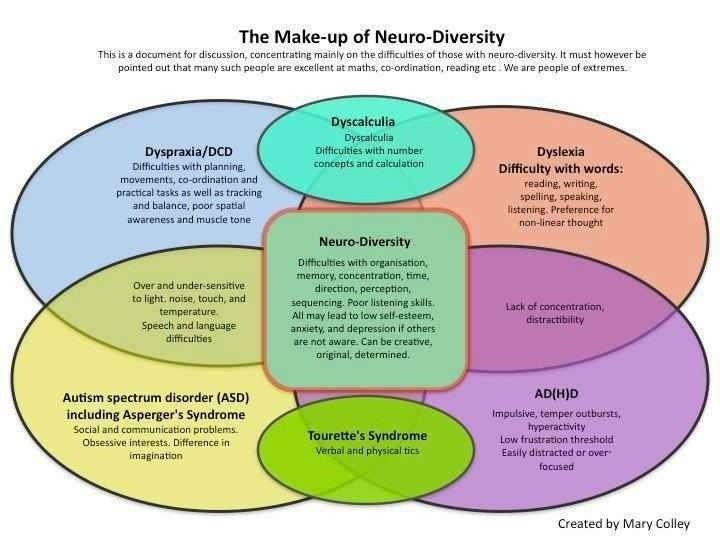
4. Spend time with friends and family
Spending time with people you care about and enjoy being around is a great way to distract yourself from anxiety. Immerse yourself in conversation or do fun activities together. Not only will this help with your anxiety, but your friends and family will enjoy spending time with you, too.
5. Journaling
You don’t have to be an avid writer to experience the benefits of writing down your thoughts and emotions when you’re feeling anxious. Just grab a piece of paper or notebook and write down everything that comes to mind. Don’t worry about making it neat or coherent. If you find that journaling helps with your anxiety, consider taking a little notebook with you when you go out so you can use it whenever you need to.
If you don’t feel like writing down your feelings, another method of journaling is to write down positive things. Try making a list of the things you are grateful for or that make you happy to take your mind off the anxiety and promote happy thoughts.
6. Yoga
Yoga⁸ is a great way to reduce anxiety. If you are new to yoga, there are plenty of beginner-friendly videos online to get you started.
7. Meditation
Meditation⁹ is also effective in reducing anxiety symptoms. There are lots of guided meditation videos and information online, as well as meditation apps you can use on your phone to access wherever and whenever you feel anxious.
8. Practice breathing techniques
Pranayama¹⁰ is the practice of breath regulation, a core concept of yoga. Breath regulation has been shown to reduce feelings of anxiety and stress. Your parasympathetic nervous system (PNS) is activated when your body is in a calm, resting state. However, when you are anxious, your sympathetic nervous system (SNS) takes over and triggers the fight-or-flight response. This causes your body to perceive that your life is in immediate danger. When you focus on taking slow, deep breaths, your body can shift back to the PNS and deactivate the fight-or-flight response.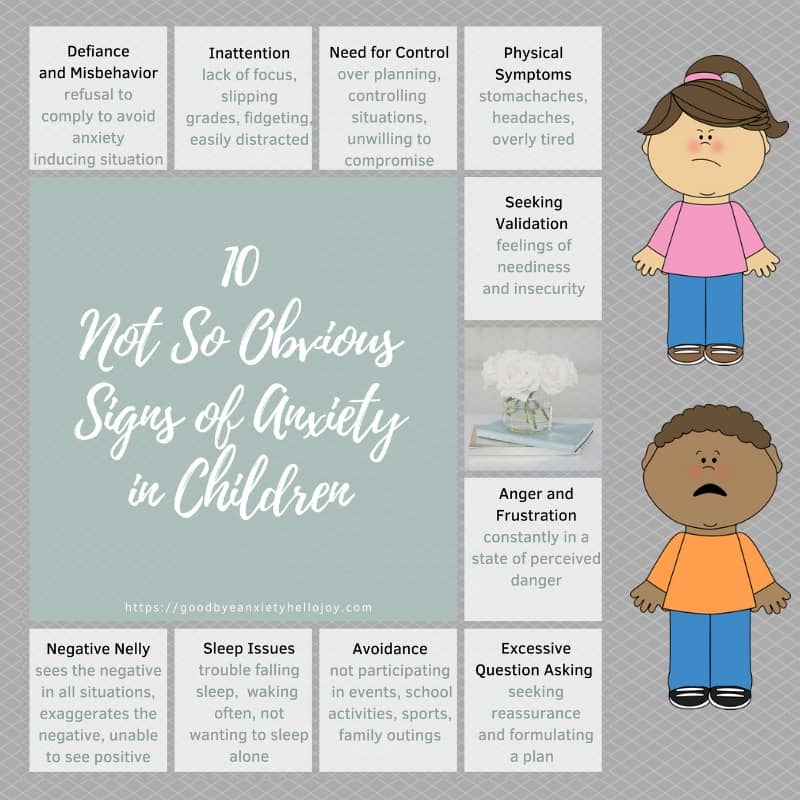
9. Get outside in nature
Getting outside and spending time in nature have been shown to relieve anxiety.¹¹ You could go for a walk, or even just sit outside and enjoy the fresh air. If you can’t get outside, close your eyes and visualize yourself sitting on a beach or in a forest, for example.
No More Chill Pills: A Guide For Natural Anxiety Management
10. Watch a movie or TV show
Watching a movie or TV show you enjoy is a great way to distract yourself from your anxiety. Research has shown that watching cartoon movies¹² helps to relieve anxiety in children.
11. Play a game
Whether you love video games, board games, or puzzles, playing a game will help to distract you from your anxiety.
12. Relax your muscles
Applied relaxation¹³ and progressive muscle relaxation¹⁴ are anxiety-relieving techniques taught by trained therapists. However, you can do these yourself at home or out in public. There are many videos available online that teach you these helpful techniques.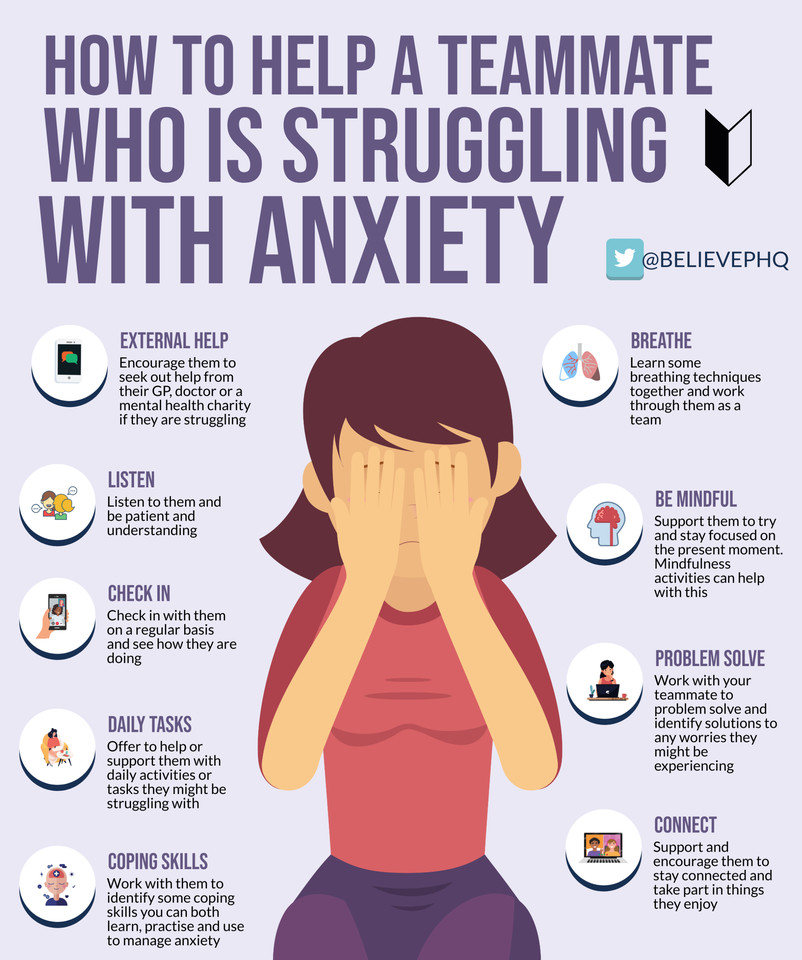
Another way you could relax your muscles is by taking a warm bath or shower.¹⁵
13. Listen to music
Research¹⁶ has shown that listening to music helps relieve anxiety, so put on your headphones and zone out to your favorite music.
14. Aromatherapy
Essential oils,¹⁷ such as sweet orange and grapefruit oils, promote relaxation and relieve anxiety by activating certain systems in the body to release endorphins. The two most common ways to use aromatherapy for anxiety are an essential oil diffuser or hand cream or roll-on oil containing the essential oil.
15. Make a scrapbook
While online scrapbooking can also offer anxiety-relieving benefits, the most therapeutic way is to make a physical scrapbook. All you need is a book, some glue, some photos that make you happy, and maybe some fun stickers. As a bonus, you now have a book of photos that make you happy that you can look at any time in the future when you feel anxious.
16.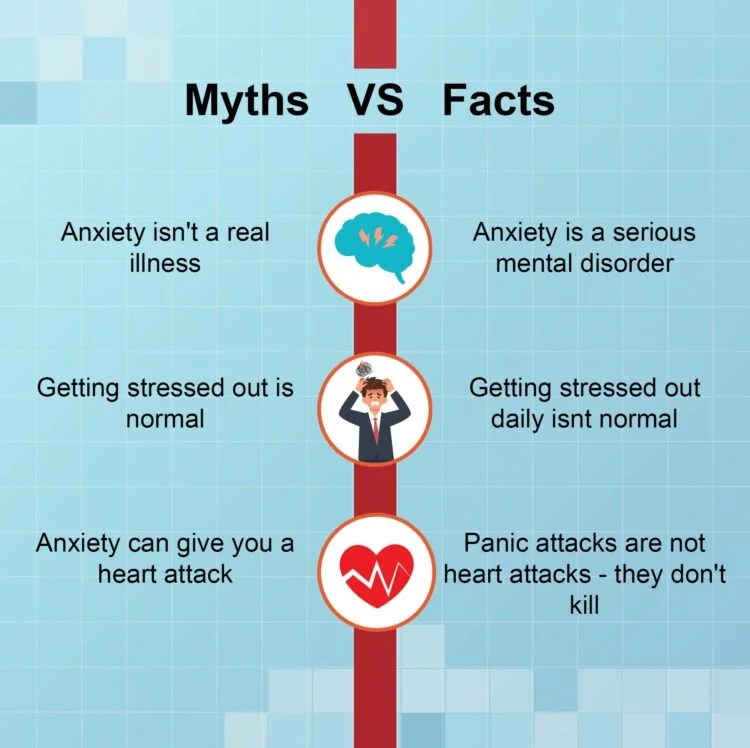 Do some coloring
Do some coloring
Not just for children, coloring in is a great way to reduce stress and anxiety in adulthood. There are lots of coloring books in stores made specifically for teens and adults who experience anxiety. They contain calming patterns and distract you from your emotions in the moment.
17. Take a nap
Taking a nap may help to reduce your anxiety. You could even use a weighted blanket. The weight from these blankets helps put your body into resting mode, making it easier to relax.
18. Clean your room
Not only will cleaning your room distract you from your anxiety, but having a clean, clear space may also help you feel more organized and clear out your mind too.
19. Read a book
Sometimes, getting away from a screen and picking up a good book can help reduce anxiety as your mind will be distracted by diving into the story and immersing yourself in the characters’ world.
Living with anxiety disorders can be very difficult, but you can use many distraction techniques to help relieve anxiety symptoms.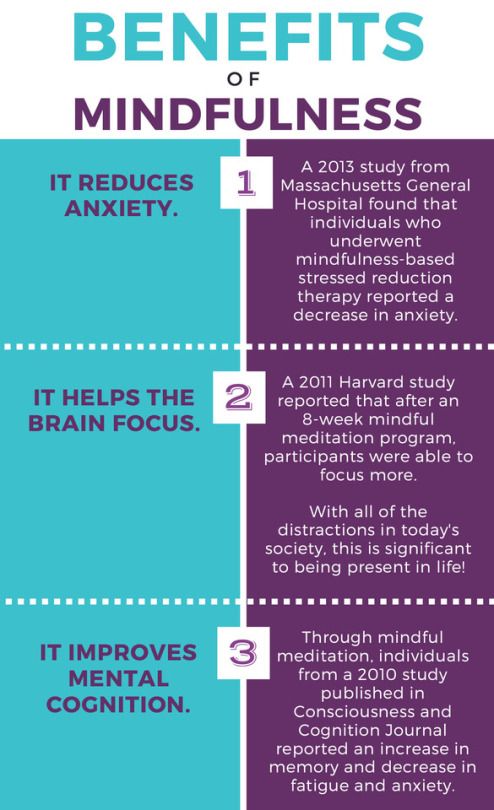
If you experience anxiety often, it is important to speak to your doctor about longer-term treatment to help prevent anxiety symptoms in the future.
How Distraction Worsens Anxiety (And How You Can Cope)
Image courtesy of reachout.com.
With mental health at an all time low, it’s important to take into account what can make depression and anxiety worse rather than better. Understanding the complexities of mental health and recognizing what’s wrong can be a great step in finding a solution to whatever you’re going through.
Many people who suffer from anxiety, specifically, will try to distract themselves from their negative thoughts. However, this has turned out to actually make anxiety worse rather than better.
Thankfully, there are other methods of coping with anxiety available to you besides pretending your anxiety simply doesn’t exist.
Distraction and Anxiety
Distraction will have a negative impact on anxiety, not a positive one. When trying to take your mind off of it, you actually might end up making your anxiety worse. But why is this?
When trying to take your mind off of it, you actually might end up making your anxiety worse. But why is this?
Well, first of all, ignoring your anxious thoughts will encourage the untrue belief that these thoughts are dangerous when they’re not, at least not by themselves. Actions are what can be dangerous, and the negative thoughts associated with anxiety shouldn’t be treated as something taboo or swept under the rug.
Thinking your thoughts are dangerous on their own can have a really harmful effect on your mental state, as your own thoughts may seem like they’re betraying you. This will likely only add to your discomfort.
While accidental distractions may help with your negative feelings short-term when it comes to anxiety, a lot of activities you may use in order to deliberately distract yourself may be harmful.
For example, trying not to think specific thoughts will inevitably result in you thinking them more. It will keep your attention focused there even as you’re actively trying to avoid the thoughts, so it’s very counterproductive.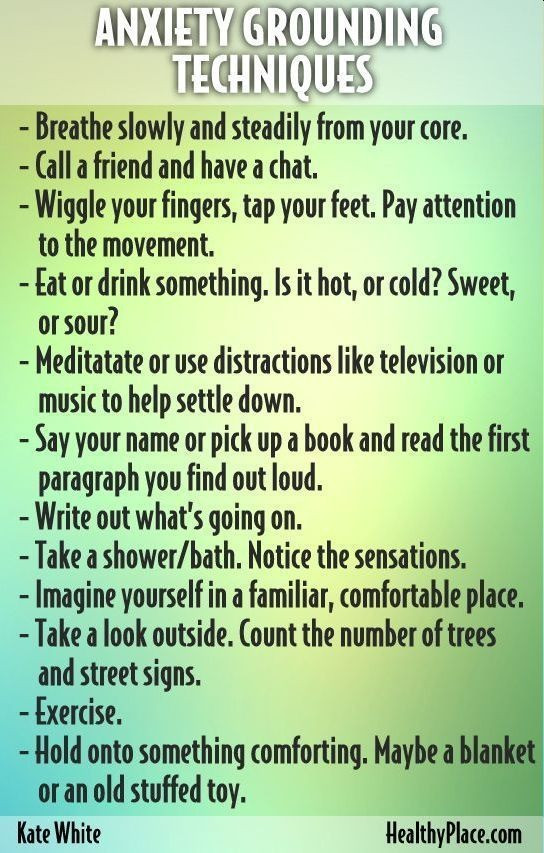
In addition, distractions other than thought-based ones can also worsen your anxiety— after all, if you’re using something to avoid the problem, then the problem won’t actually get solved.
When you begin to feel anxious, your brain may seem to insist you do something to take your mind off of it, but choosing these distractions rather than coping can create some not so good habits— habits that you’ll keep coming back to rather than facing your anxiety.
Some popular distracting activities that people do are going on their phone to check social media, grabbing a snack, or watching Netflix. These mindless types of activities will make you feel better in the short-term.
But long-term they only help contribute to the vicious cycle of anxiety, because you’ll eventually need more and more of these things in order to have the desired positive effect.
Doing something to take your mind off of your anxiety isn’t necessarily a bad thing, but when these activities stop feeling rewarding it should be taken as a sign to stop.
It’s also important to avoid becoming dependent on alcohol or other substances in order to feel better, because that in particular is a bad habit that can become very dangerous very quickly— and it’s even harder to break out of.
The most important thing to do, at the end of the day, is to make sure you know your own mind. Don’t become dependent on your distractions.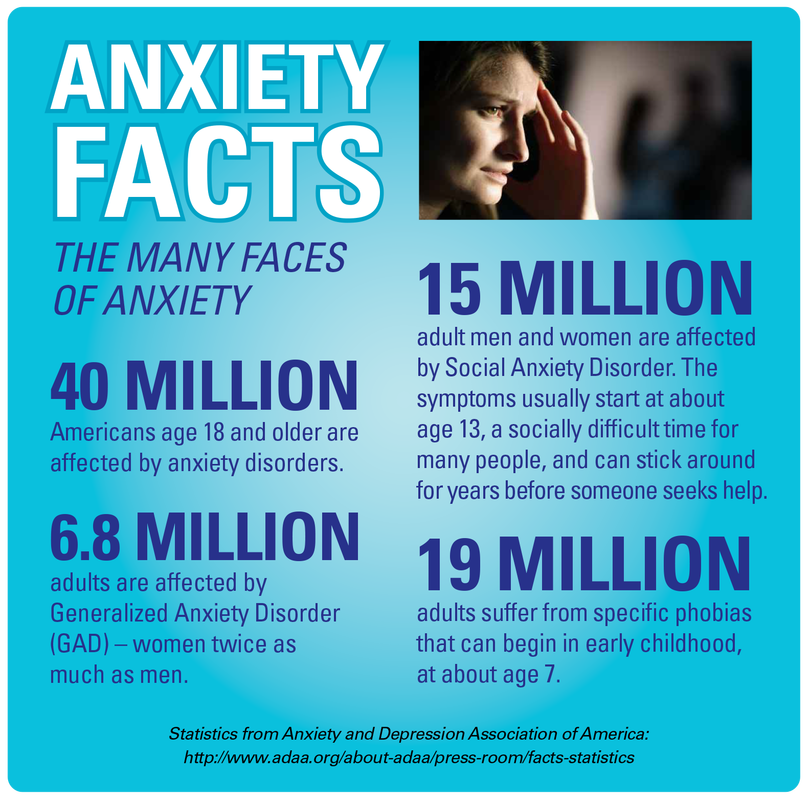
Effects of Anxiety
Anxiety itself can be incredibly harmful, and it can manifest in many different ways. Social anxiety, panic attacks, GAD, PTSD, OCD— all of these are different forms of anxiety that all have different symptoms associated with them.
While your body is equipped to handle the stressful symptoms associated with anxiety on the short-term as reactions to danger, dealing with anxiety long-term can have a negative impact physically as well as mentally.
Anxiety can lead to more health concerns because of how your body physically reacts to it. For example, it can drive your hormones levels up as well as your nervous system, which will release cortisol to increase your sugar levels.
A little cortisol can be a good thing. A lot of it, or too much of it, can lead to physical concerns such as problems concentrating or remembering things, trouble with sleeping and digestion, high blood pressure, a less effective immune system, and even heart attacks in some cases.
The symptoms that anxiety itself brings with it are also a very serious matter. These include — but are not limited to — constant feelings of worry or dread, difficulty relaxing or thinking clearly, feeling hopeless, and frequent thoughts of danger or death.
If anxiety is left untreated or undiagnosed, your brain can be physically affected by the symptoms— the parts of your brain where these anxious feelings register may actually shrink in size, which will make you more prone to anxiety and add to the negative thoughts you’re already struggling with.
For this reason, if you think you or a loved one may have anxiety, it’s important that you recognize it rather than distracting yourself from it, and see a mental health professional who can help you to overcome your anxiety or at least make it more manageable.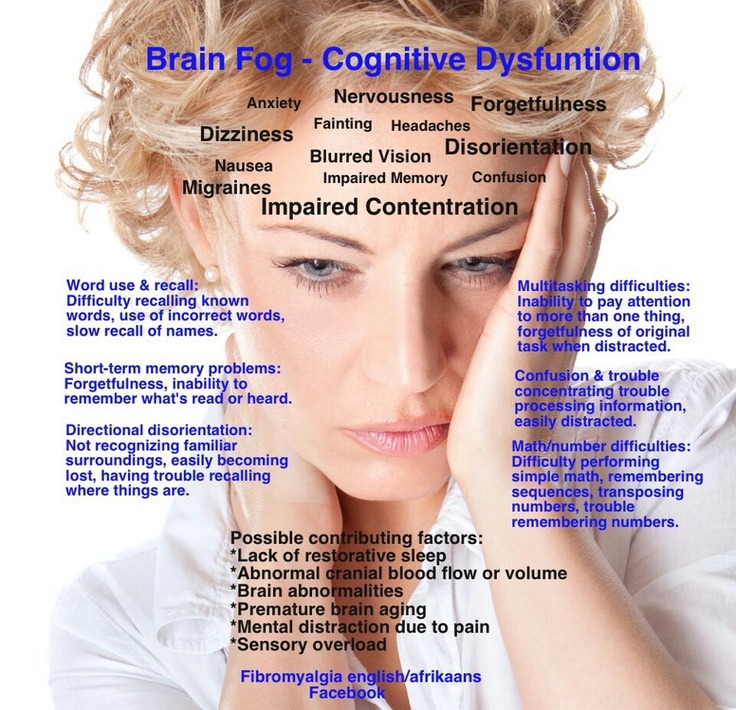
There are, however, also a lot of things that you personally can do to decrease the negative feelings that are associated with anxiety in a healthy way.
Coping with Anxiety
Finding healthy coping mechanisms to help deal with your anxiety can be invaluable. Seeing a mental health professional may help you develop some that are specific to you and your anxiety, but here are a few broad, simple ways to get started!
For starters, taking good care of your body is an absolute must, and it can actually help decrease your feelings of anxiety. You should make sure you’re always having three balanced meals a day, and avoid things like caffeine or alcohol that can worsen your anxiety.
Creating an exercise routine can help you feel good both mentally and physically, though remember not to overwork yourself— that can have the opposite effect. It can also help provide some structure.
It’s also absolutely essential that you get enough sleep, especially when you’re feeling stressed.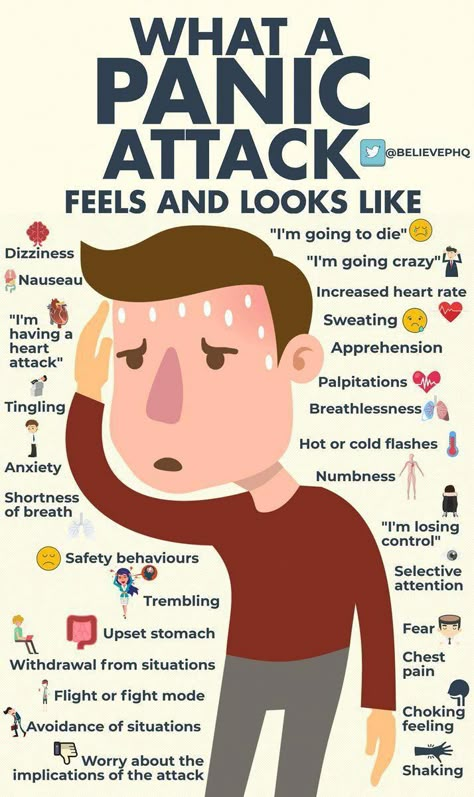
When it comes to actually experiencing anxiety, particularly panic attacks, breathing exercises may become your best friend to help calm you down. Taking deep breaths and counting slowly to ten may do wonders.
You should also try and embrace a positive attitude, which may sound impossible, but it can really work! Even if you don’t believe them at first, thinking positive thoughts can help get rid of the negative ones!
You should also let yourself laugh and have a good time. It’s the best way to fight anxiety— some people have found success in making fun of the anxious thoughts themselves, especially if those thoughts don’t have anything to do with an actual problem you’re experiencing.
It can aid in overcoming said thoughts to maybe think them in a funny accent or turn them into a song or poem.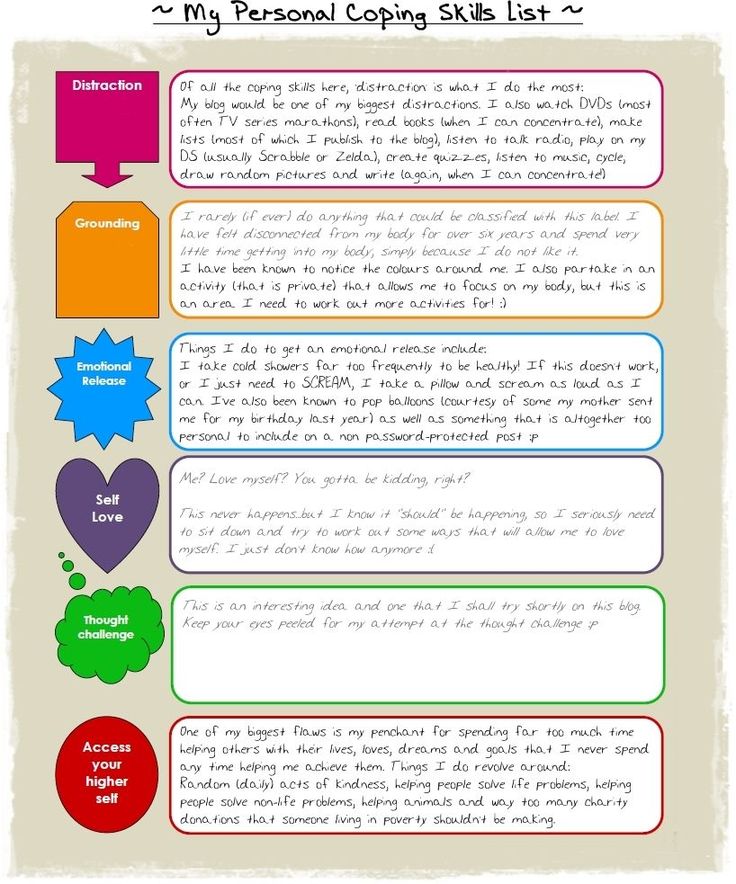 If you do this, the thoughts caused by your anxiety may seem a whole lot less serious.
If you do this, the thoughts caused by your anxiety may seem a whole lot less serious.
That said, it’s important to remind yourself that you’re doing your best. Don’t beat yourself up for having a bad day, and make sure to put things in perspective once in a while. Things really might not be so bad if you take a second to look at them objectively!
You should also try and learn what triggers you have— what causes your anxiety. That way, maybe you can take steps to avoid them.
There are also steps you can take to stop distracting yourself from anxiety in intentional, harmful ways. Think about your thoughts, and about why you’re having them. Analyze your anxious feelings rather than running away from them, and you may actually find a solution!
The best solution, however, is still talking to someone. Speaking with a mental health professional should always be encouraged, but if you don’t feel comfortable with that then at least consider speaking with a friend or family member about your anxiety. Chances are that they’ll want to help you.
Chances are that they’ll want to help you.
It’s just as important to have a good support system as it is to have successful coping mechanisms, and bottling things up or relying on distractions will only add to your anxiety.
The top 3 distractions that affect your productivity
Your phone and social media are not the main distractions at work
You need to look beyond your gadgets.
"The art of being wise consists in knowing what to ignore," wrote psychologist William James. Unfortunately, if these words are true, then only a few of us can honestly call ourselves wise people. Knowing where to direct our attention has become the greatest challenge of our lives. And we don't make the problem any easier by exposing ourselves to so many distractions.
Many of us struggle with distractions every day without really understanding what distracts us and why. But if we want to focus on something important, on productive work, we need to be able to understand what is standing in our way.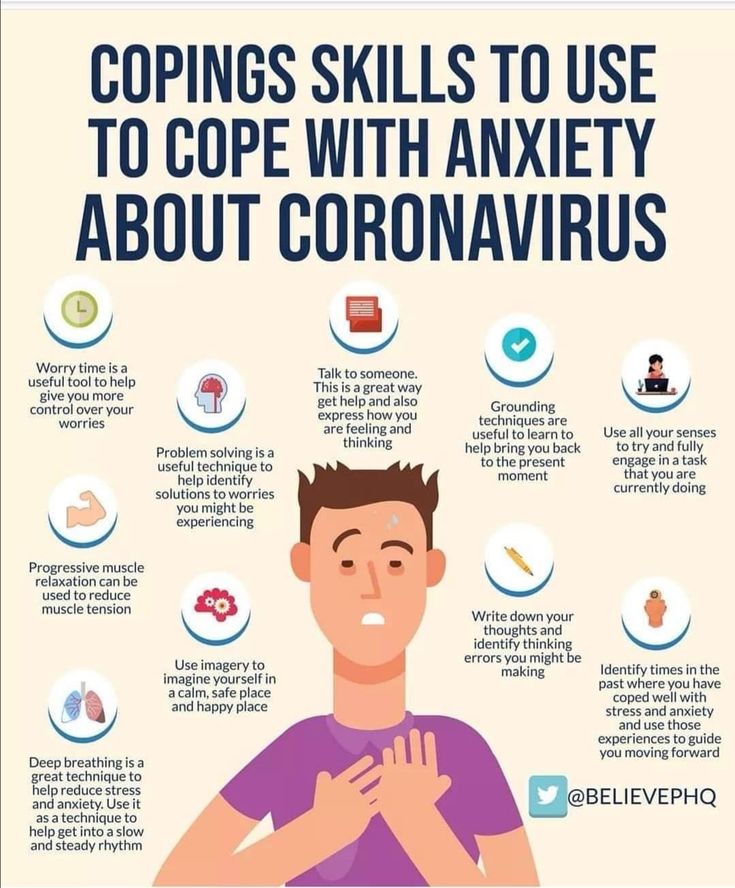 Why are we so easily distracted? Is it possible to realign our attention in our distracting work environment?
Why are we so easily distracted? Is it possible to realign our attention in our distracting work environment?
There are only two types of distractions you need to worry about
Ask anyone about their distractions and you will most likely hear about a combination of phone, social media, and the people around you. These are all really distractions, but we need to shift our perspective a bit if we want to truly understand what is taking our attention.
According to Daniel Goleman, author of Focus: The Hidden Power of Excellence, there are really only two kinds of distractions:
- Sensory distractions (external) . It's what's going on around us: colleagues talking, phones ringing, people moving, music playing, and so on.
- Emotional distractions (internal) . These are thoughts that cause our attention to shift from what we are doing. For example, if you suddenly think about the fact that you needed to call someone back or about an upcoming meeting.
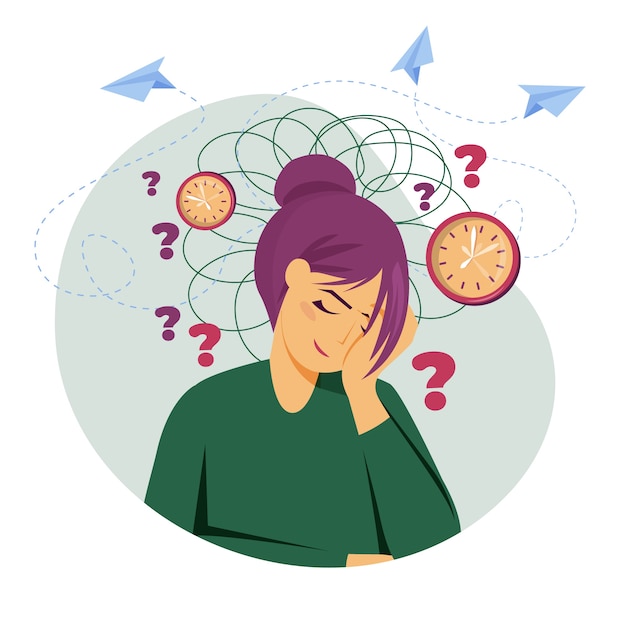 The problem is that most of us focus on external distractions. It's easy to blame your lack of focus on notifications and other distractions.
The problem is that most of us focus on external distractions. It's easy to blame your lack of focus on notifications and other distractions.
Either way, according to Gloria Mark of the University of California, Irvine, we distract ourselves just as much as external distractions do. As Goleman puts it, "It's not the chatter of the people around us that distracts us the most, but the chatter within our own minds."
Emotional distractions are a symptom of our work culture
Internal distractions are much more difficult to manage because they can't be fixed by simply turning off notifications. And while we've written about how to tune tools like Slack or Gmail for better concentration, there's no definitive guide on how to tune your brain to focus.
And even if such a guide existed, it would certainly do more harm than more. And this is where things get pretty weird. While part of your brain is fighting for 100% focus, another part of your brain is looking for something to distract itself.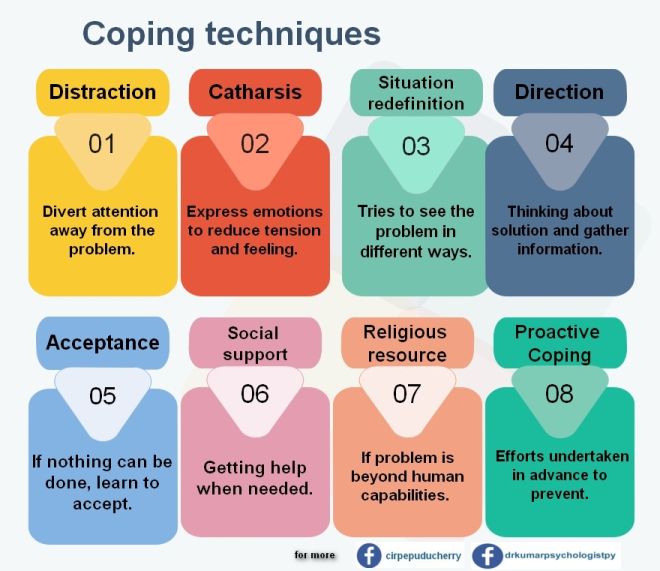
According to Matthew Crawford, author of The World Beyond Your Head: Becoming an Individual in an Age of Distraction, distraction is much less a matter of gaining control than of establishing control over a situation. Crawford is convinced that we are obsessed (too much) with autonomy. In fact, when researchers studied the qualities of the most satisfying jobs, flexibility, autonomy, and control were among the 6 most important qualities.
Unfortunately, few of us actually have autonomy and control over our daily lives. When we interviewed over 500 knowledge workers, only 10% of them said they felt "in control of how they spend their time every day." So it's only natural to want to take control of that time. Even if it means you have to take a break for it.
We all want to do our best work, and the loss of concentration only leads to overwork, stress and burnout. One way or another, when you begin to realize that you are distracted by both external and internal or cultural problems, you can begin to delve into their root.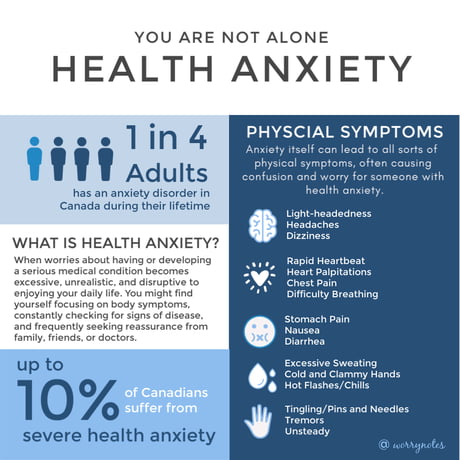
Here are three main ways your work culture promotes internal distractions (and how to deal with them).
Problem: Remote work or lack of social interaction
Alan Hedge, an expert in workplace design at Cornell University, argues that the fact that we are social creatures makes it especially difficult to ignore distractions related to other people - which makes up the bulk of all the distractions we face during our work day. Either way, avoiding any social interaction is just as much of a distraction.
As Future Workplace Research Director Dan Schawbel told our publication, "The biggest problem that most people face on a daily basis - regardless of who they are, how much they earn or how they define themselves - is isolation." Work lockdown pushes us to Twitter and Facebook. Or check our email and messenger every 6 minutes to see if there's anything new.
Solution: make time for meetings, calls and social activities
To combat the distraction caused by isolation, we need to balance our need for concentration with our need for socialization.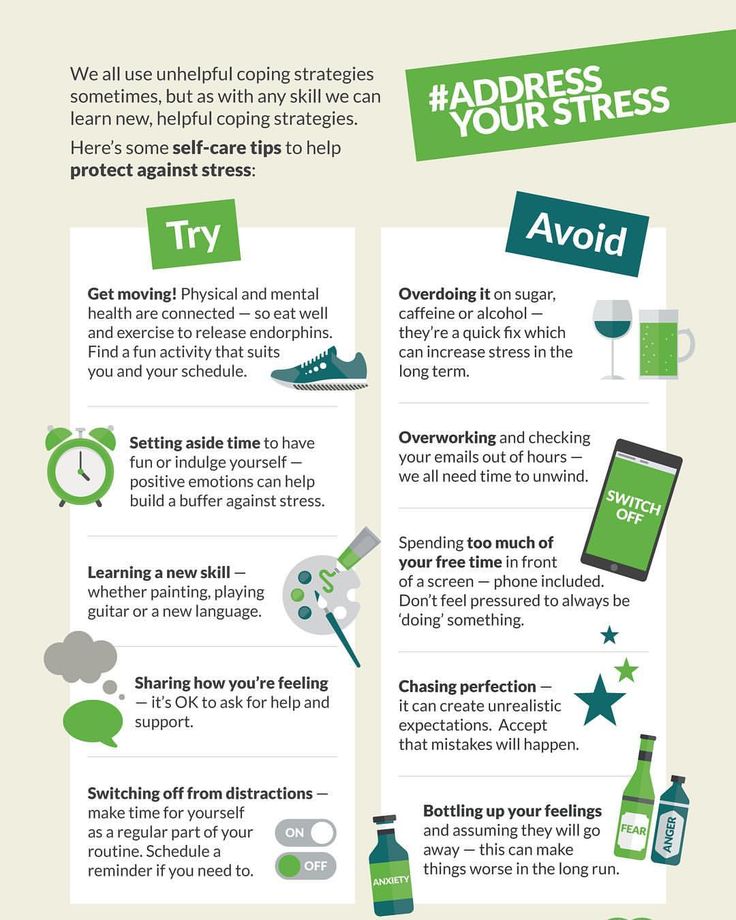 This means that we need to take the time to connect with the people you work with and not just rely on impersonal communication.
This means that we need to take the time to connect with the people you work with and not just rely on impersonal communication.
The Problem: Multitasking
Today we already know that multitasking is a myth. However, we still try to do more than one thing at a time.
Living in a space of constant semi-mindfulness causes our brains to lose focus. According to Goleman, our brains want us to make a plan for how to deal with the things that matter to us. And when we don't, these unfinished tasks keep popping up in our minds and thus distracting us.
Solution: Implement a work schedule designed around single-tasking
Lack of priorities is probably one of the biggest distractions at work. As Kurt Steinhorst, author of Can I have your attention?, writes, distraction is really just confusion about what really matters.
If that's your case, dealing with distractions will be about prioritizing and making time for your most important tasks.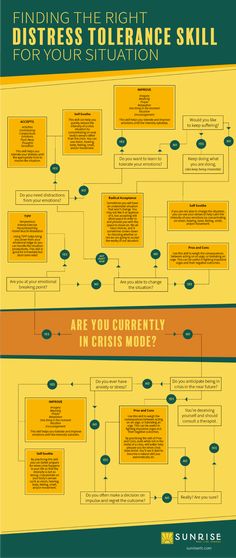 Fortunately, we have already written about both.
Fortunately, we have already written about both.
Problem: Unpredictable Work Environment
Finally, our work environment is rarely conducive to concentration.
According to David Rock, author of Your Brain at Work, distractions are a part of our lives because we can't completely avoid them: We pay attention to everything new.
Our brains are great at noticing anything that doesn't fit into a familiar pattern. We lean toward novelty, which is what makes distractions—like a coworker talking loudly or an overheard monologue—so hard to ignore in our monotonous workdays.
Solution: Take it easy on distractions
It may sound paradoxical, but blocking out distractions in your environment is not the best solution. Instead, you need to learn how to live comfortably with them. It's easy to blame notifications, social media, and loud colleagues for distractions. Unfortunately, this is a very superficial approach.
Internal distractions are just as dangerous, but receive much less of our attention.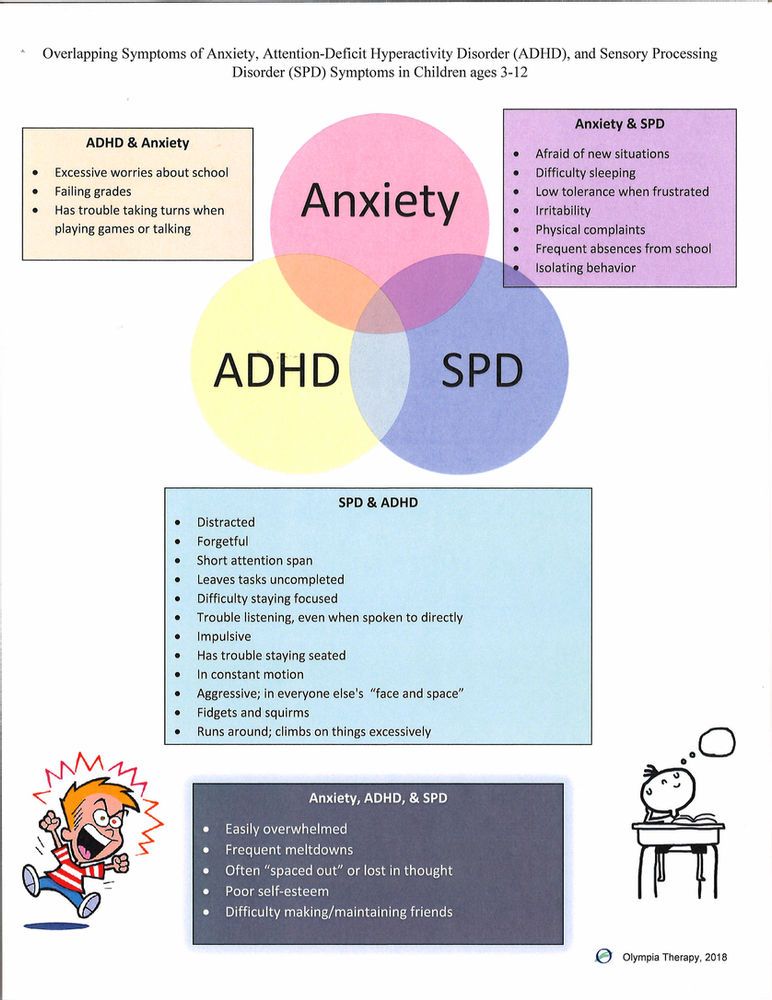 The only way to deal with distractions is to know why you are distracted.
The only way to deal with distractions is to know why you are distracted.
The 5 worst distractions that affect your productivity and what to do about them
Distractions are tricky. They tend to sneak up on you without warning and don't ask permission before invading your space and stealing your attention.
Whether positive or negative, pleasant or unpleasant, the effect is the same: distractions waste precious time, reduce productivity, and require more effort and time to get back on track.
Listed below are five of the most common and insidious distractions that take up your time and productivity. Bundle and leave them unchecked and you could compromise your ability to deliver on time. Get them out of your sight and out of sight and your productivity will skyrocket almost instantly.
Content
Distraction 1: Your Inbox
Whether it's important or not, anything that goes into your inbox needs your attention. Ignoring the influx exacerbates the situation; emails grow to tens, then hundreds, then thousands.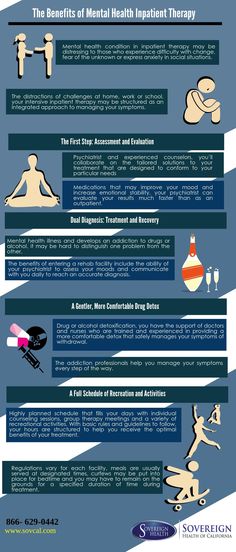 Determining what's important becomes harder and harder until the worry of missing out on an important message in the midst of a barrage of messages becomes a constant distraction.
Determining what's important becomes harder and harder until the worry of missing out on an important message in the midst of a barrage of messages becomes a constant distraction.
What to do about it
1) Unsubscribe . Much of what comes into your inbox is likely to be unnecessary or out of date. Start by unsubscribing from newsletters and promotional messages that have your email address. Unsubscribe from everything that does not help you in a tangible way.
2) Organize everything into folders . Creating folders and moving emails from your inbox there will greatly reduce the pressure and confusion. There may also be newsletters and publications that you don't want to unsubscribe from and that you prefer to keep, but not necessarily read, whenever they arrive. Folders can take care of that. Automate the process with email rules to make life easier.
3) Do preventive maintenance . One great way to prevent your inbox from overflowing from now on is to completely change your approach to email.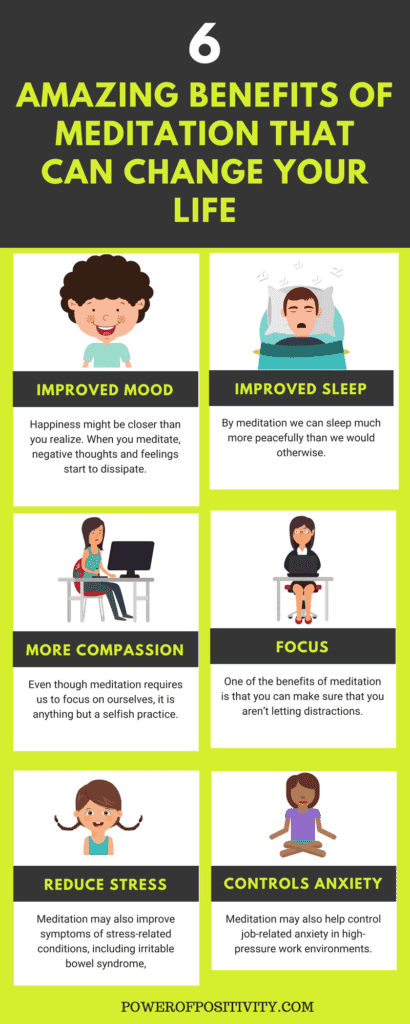 Avoid conversations that create additional conversations with a dozen people on the "cc" list. Avoid creating opportunities for more responses containing more opinions. Make sure every email you send solves a problem and moves the project forward.
Avoid conversations that create additional conversations with a dozen people on the "cc" list. Avoid creating opportunities for more responses containing more opinions. Make sure every email you send solves a problem and moves the project forward.
Distraction 2: your social media feeds
Checking what's happening on social media is a constant distraction and hard to resist. But it's no secret that your social media feed is highly addictive. It doesn't take long to realize just how much social media influences our attention and how much of your mental space it takes up.
What to do about it
Start by eliminating the dopamine rush you get every time you open your social media feed. This will make it easier for you to take the next step: schedule a time during the day to check in on social media for a while.
Distraction 3. News
Being on the news is important, but how much time does it cost and what does it add to your day when most of what you read or watch is more negative than positive? The last thing you need at the beginning of the day, and indeed throughout the day, is a roundup of news that drains you and affects your mood. In addition, there is very little urgent or important business in the news to leave work unfinished.
In addition, there is very little urgent or important business in the news to leave work unfinished.
What to do about it
The best time to follow the news is during a break, just like the news on social networks. Do it quickly and don't get carried away.
Distraction 4: Your Phone
Whether you answer the phone or not, you are at the mercy of anyone who might decide to call you at any moment. This is not a good state if performance is important to you.
What to do about it
To maintain high productivity, you need to stay focused on a task for extended periods of time. You don't have to put yourself at the mercy of a phone that can ring at any moment and interrupt your train of thought. That's why putting your phone on silent and checking it at regular intervals, like when you're between tasks, is a wise thing to do if you want to stay productive throughout the day.
Distraction 5: visual and auditory distractions
You can ignore your mailbox and put your phone on silent, but visual and auditory distractions will be thrust upon you if you are receptive.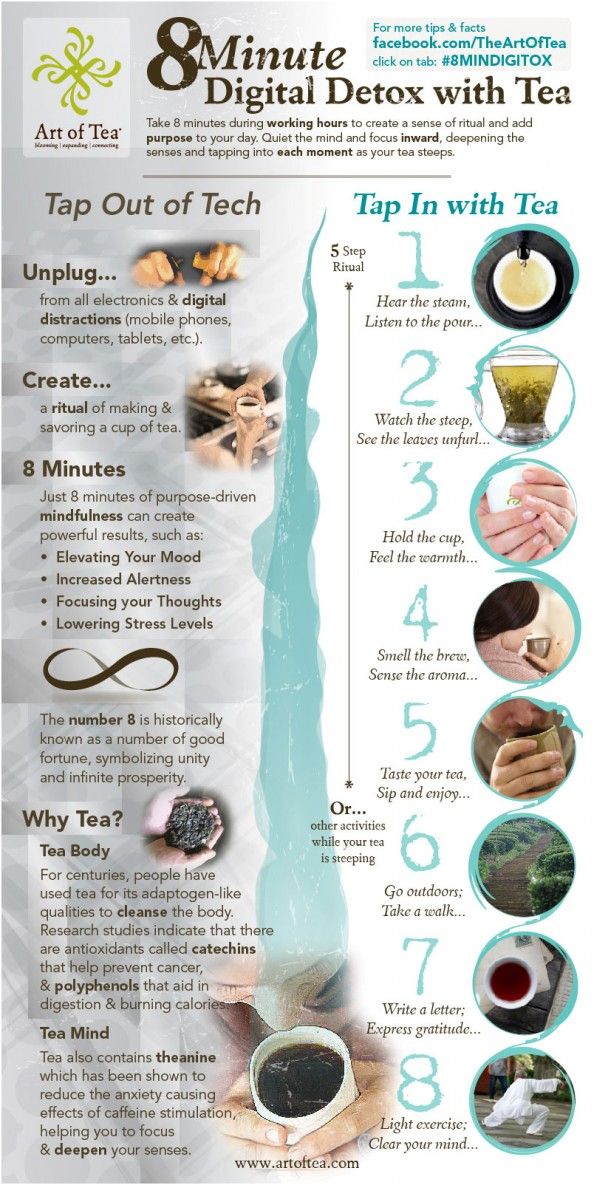 Sometimes, when focus is very important, this can be a major hurdle.
Sometimes, when focus is very important, this can be a major hurdle.
Socialization, flippant conversations of colleagues entering and leaving the office, debates over projects that are not related to you - all this greatly burdens your attention and creates constant pressure to distract you from your current tasks.
What to do with it
1) Clear field of view . Does your field of vision contain a source of constant visual distraction, such as a TV that is always on? Are you sitting near a noisy hallway with people passing by? All of these distractions insidiously undermine your ability to think clearly for extended periods of time. There are several ways to isolate your field of vision from distractions, depending on your workplace, whether you work alone or in a crowded office.
2) Isolate your auditory field . Another source of distraction is sounds and noise. Using obvious tricks like listening to music is one way to isolate your auditory field, but it's important to avoid listening to music you enjoy because then the music itself becomes a distraction.